Pilot: Season 1 Episode 1
Written by Chris Carter, Directed by Robert Mandel
First aired September 10, 1993
Most pilots are a homogenized swirl of introductions, clunky expositions, and a vague please-please-like-me desperation. This pilot is so successful by contrast because it serves as showrunner Chris Carter’s thesis statement. Despite occasional elements that don’t quite jive with the rest of the series, there is an extraordinary amount of X-Files ethos already in place. There are even a few details which are near and dear to my heart already there, such as Scully’s cross and Mulder’s sunflower seeds.
What I love about these early episodes is that they’re so much more about evoking a sense of the uncanny than about the aliens themselves. As far as aliens go, you’ve got some people with what looks like melanoma disappearing in swirl of leaves for no apparent reason and then later turning up dead. Added to that is one of Carter’s specialties: subtle but recognizable elements of myth, altered just enough to suit the story. Here we’ve got the time loss, bright light, weird noise, and implants of alien abduction accounts. But that’s it. We don’t know what the disappearances are about, whether this group of people is connected to the earlier cases Mulder references in his office, nothing. It’s not a jungle out there, it’s a dense Pacific Northwestern forest.
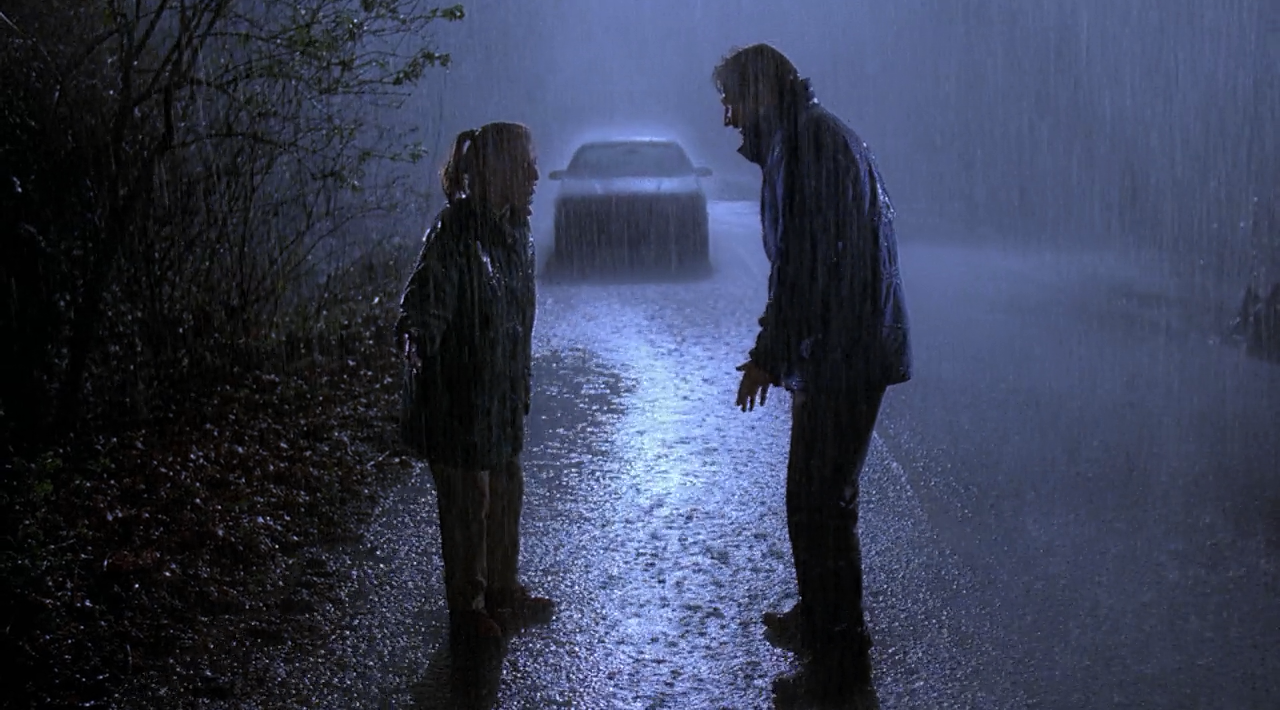
The “don’t trust authority” element is more finely-tuned, which demonstrates where Carter’s heart really lies. The case in Oregon is a familiar story: there’s a huge problem and instead of grappling with it, the powers that be sweep it under the rug. The Sheriff, medical examiner, and local detective know that Billy is somehow responsible for his (largely female) classmates’ disappearances and deaths. But Detective Miles’ wish to protect his son is more important than telling the truth of how and why the victims died. The point of course can be taken too far, given that no one has any clue how or why Billy is doing what he’s doing or how to stop him. Still, the power-privilege element is already there.
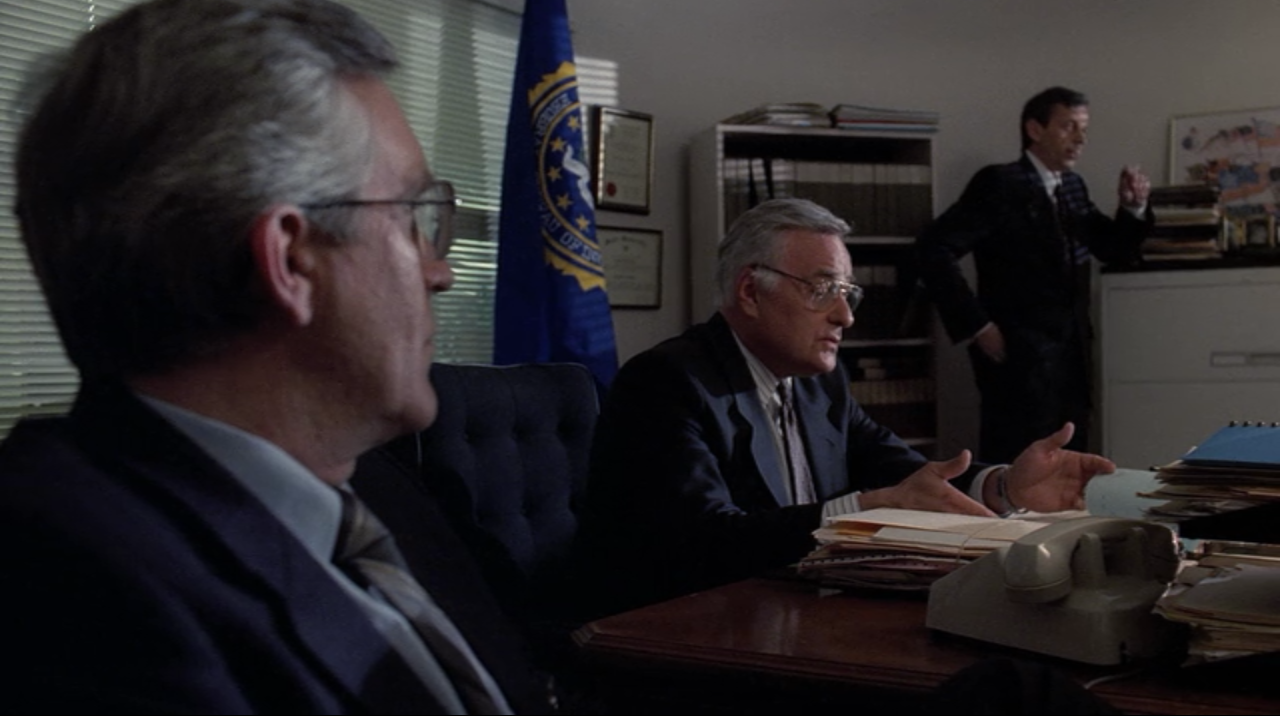 The Panel o’ Patriarchy
The Panel o’ Patriarchy
This power imbalance is even more obvious in the characters of Blevins and The Cigarette Smoking Man. I imagine that to Blevins, Mulder is an inconvenience. Why, Blevins must be asking himself, is this bright kid spending so much time shit-stirring in the basement? He can’t shut Mulder down directly because of those mysterious Congressional contacts, so he opts for the only slightly less obvious option: send in an impressionable, easily manipulated, eager to please little girl to debunk him. Blevins has no concept that others (especially fresh faced young women) may have ambitions and agendas of their own. Which leads me to the thing that the pilot does best, that indeed the whole show does best: Mulder and Scully.
Compared to the rest of the series, this first glimpse of Scully is unusually open, candid, and earnest. She smiles sweetly at the Panel o’ Patriarchy when they thank her for coming, and she divulges surprisingly personal information about herself for a work meeting. (I know, exposition, but still.) “My parents think joining the FBI was an act of rebellion,” she confides, “I saw the FBI as a place I could distinguish myself.” She’s nervous. She wants them to like her, to give her an opportunity to do something important.
Blevins thinks he has her exactly where he wants her, and in his confidence he makes his first mistake. He asks her what she knows about Agent Fox Mulder, and then fails to pay attention to her response.
Scully delivers her spiel about Mulder: Oxford-educated, super brilliant writer and profiler, and…he had the nickname ‘Spooky.’ The thing is, while listing Mulder’s qualifications is undoubtedly exposition, Anderson’s delivery makes it interesting. She rattles off this information the way I would have recited facts about Napoleon in high school: desperate to mention everything I’d memorized and convince the teacher I knew my shit. My question, though, is why does she know so much about an agent she’s never met? I sure as hell don’t memorize the educational and professional histories of anyone I work with. Besides, Scully works in Virginia teaching and Mulder works in DC as a field agent. It would be easy to pass this off as pilot-pains. There’s a better possibility though, because in the original draft it was Blevins who delivered this speech, not Scully. Now there could be practical non-character reasons for giving Scully the speech. But I think Scully has been following Mulder’s work, and I think she’s already curious about him and interested by him. If she altered the tone she delivers this speech in only slightly you’d think she was talking about a new boyfriend. I don’t mean that she’s infatuated with him—after all, they haven’t laid eyes on each other yet. Only that when she later tells him that she’s looking forward to working with him and she’s heard a lot about him, she sincerely means it.
Take this headcanon or leave it, but it gives a nice additional layer to Scully’s reaction when she realizes they’re sending her to bring Mulder to heel. Mostly, though, it’s an insult. Scully is also pretty fucking brilliant, having already received a degree in Physics and put herself through medical school before going through the academy and landing a teaching job in Quantico at twenty-seven. Not sure that’s even possible but we’re running with it. Now, instead of valuing her brilliance and her capabilities, they’re sending her to babysit the problem child, and they won’t even have the courtesy to be open about it.
And this is when we meet our Scully. She squares her shoulders and purses her lips in controlled anger and defiance. This is Scully’s fighting stance, and fortunately for us, the Panel o’ Patriarchy don’t realize how gravely they’ve misjudged her.
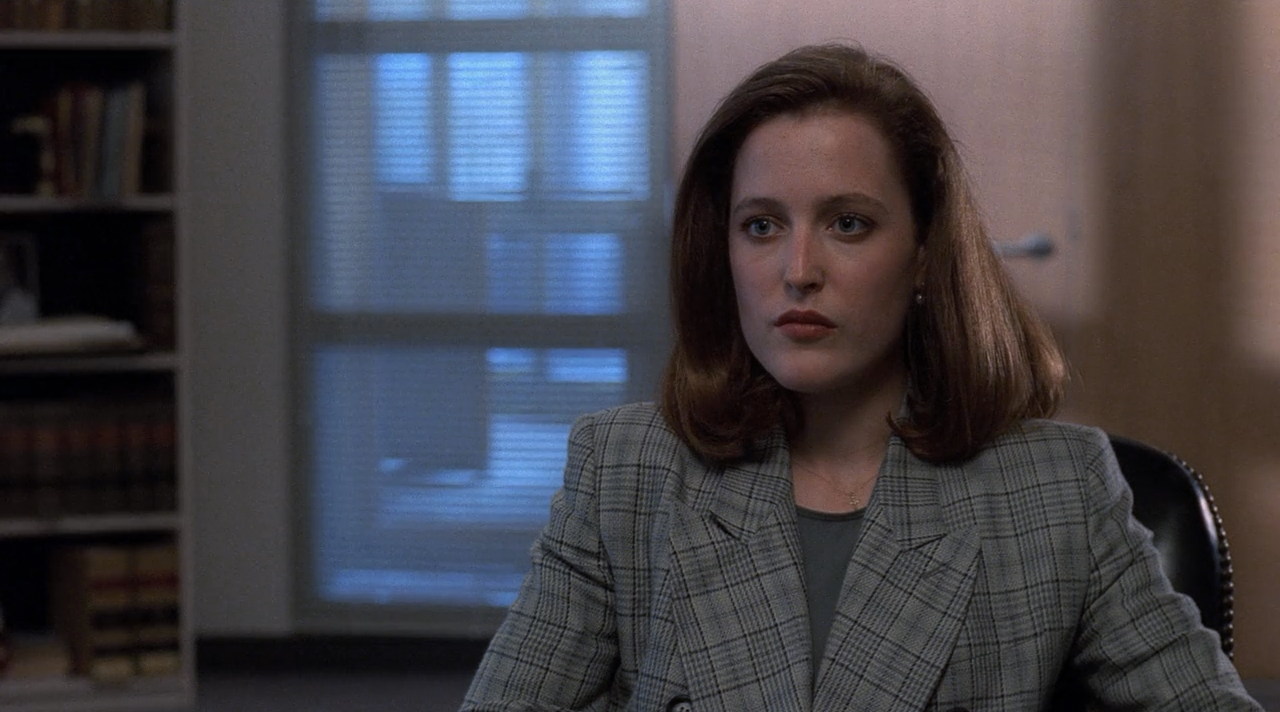 Agent Scully invites you to fuck off.
Agent Scully invites you to fuck off.
And now we finally meet the object of all this speculation. The original draft of the script describes him thus: “With his longish hair, boyish good looks, Mulder doesn’t look FBI; more like an MTV VJ. But if Mulder is difficult, he is not cruel. More mischievous; and intense. The FBI’s bad boy in the basement.” (Oh God, that grammar. Send help.)
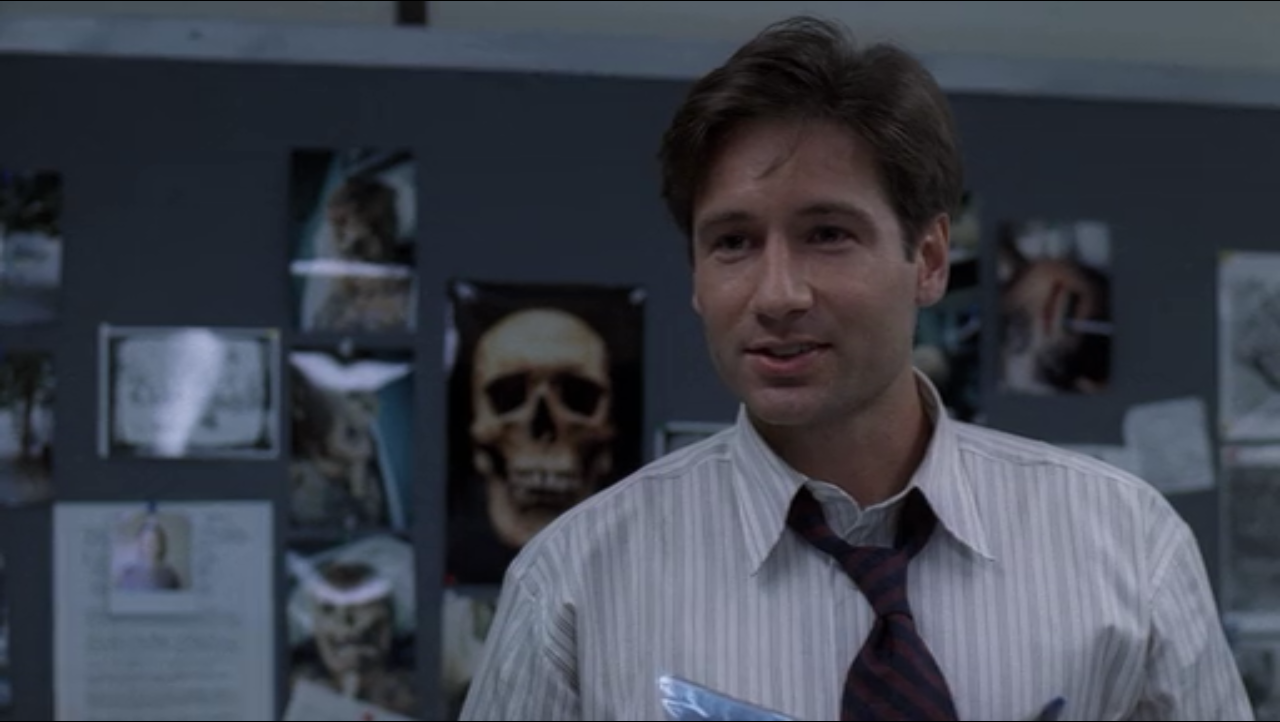 Fox Mulder ≠ Carson Daly
Fox Mulder ≠ Carson Daly
What’s delightful here is that both of these characters have distinct expectations for this meeting, but their chemistry completely overrides whatever they thought was going to happen. We can’t quite know what Scully was expecting, but it certainly wasn’t to be greeted with, “Sorry, nobody down here but the FBI’s most unwanted!” and then to be immediately launched into an interactive slideshow presentation. It amuses me, incidentally, to think of Mulder passive-aggressively putting together said slideshow while he waited for his new partner. Muttering to himself, probably. “What would Einstein say about that, DOCTOR SCULLY?”
Several other recaps have commented that Mulder doesn’t exactly show Scully the level of courtesy she deserves. Can we really blame him, though? His mission in life is to expose secrets which the government is determined to keep buried, and he sincerely believes that this woman has been sent to undermine and sabotage his work. In Mulder’s place I’d have shown Scully a great deal more ice, not less.
For Mulder’s part, I think he was expecting someone far more uptight and openly hostile, or at least openly aligned with the Panel o’ Patriarchy. I’ve probably seen this episode once or thrice too many times, but I also see a brief “wait, what?” expression on his face when he turns to see the young adorable Scully instead of the harpy tax auditor he was probably expecting.
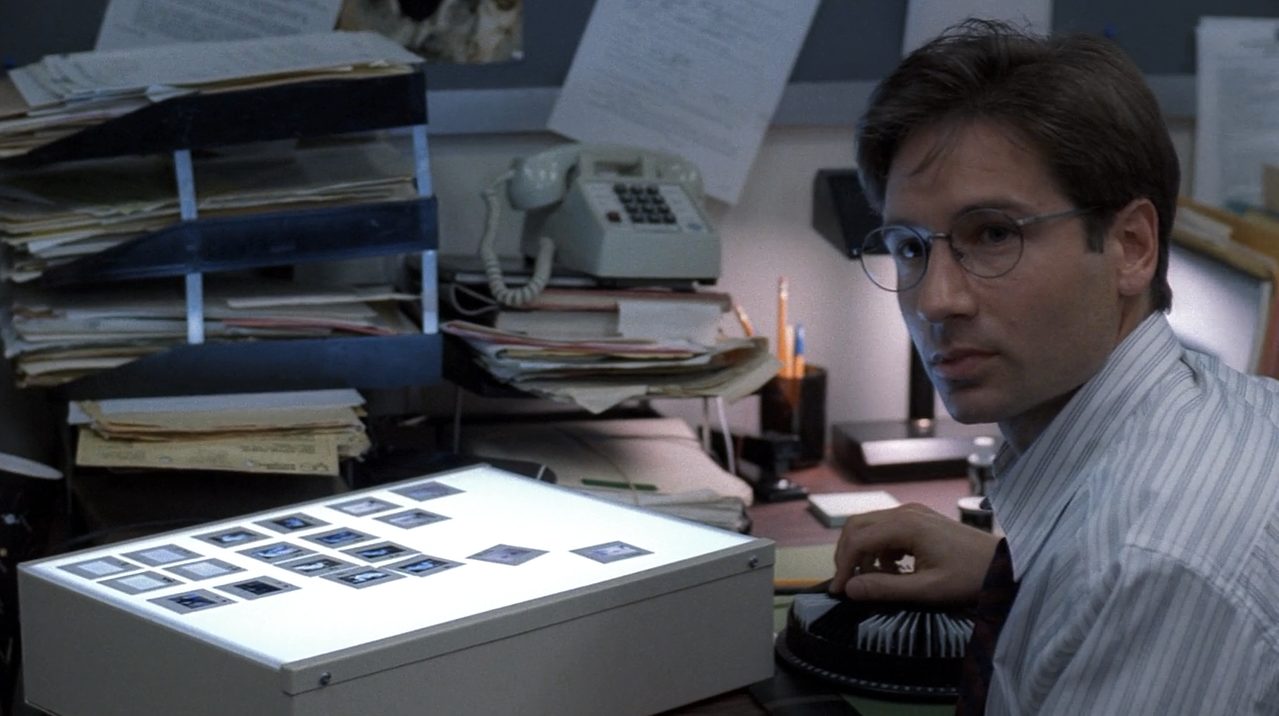 I ship them from this moment forward.
I ship them from this moment forward.
It would be easy to interpret most of Mulder’s tap dancing and posturing in this first scene as Duchovny trying to feel his way into the part or as funky direction—especially since Mulder was originally supposed to be more Puckish. I think it’s also Mulder trying very hard to not acknowledge how much he instinctively likes Scully and how much he enjoys intellectually sparring with her. He doesn’t want to like her—she’s been sent to shut him down. But he does, and he can see that she has absolutely no problem calling him on his bullshit or rising to the challenge of the case. Whether she credits his theories or not, she’s interested and invested in the mystery right away. Which I’m sure is a damn sight better than how most of his colleagues react to him.
Throughout the entire series Mulder and Scully seem to be opposites—here let me make the obligatory nod toward the tired juxtaposition of believer and skeptic and never waste time on it again. They’re not opposites, they’re mirrors of each other. This introductory scene has a few first instances of that. Just as Scully rattled off Mulder’s resume, Mulder interrupts Scully’s feather ruffling to recite her qualifications: degree in physics, medical doctor, ballsy enough to rewrite Einstein when she was a senior in college. And he read her work, too. Never underestimate the seductive power of a man who reads what women write. Duchovny and Anderson also mirror each others’ head jiggles in the “Do you believe in the existence…” and “You just have to know where to look” exchange. Also, the lighting never gets much brighter than it is in this scene. Just fyi.
In this scene another influence comes out that unlike the references to Silence of the Lambs and Twin Peaks I haven’t seen mentioned elsewhere: Sherlock Holmes. Mulder is obviously influenced by Holmes. Consider the Conan Doyle quote, “Once you eliminate the impossible, whatever remains, no matter how improbable, must be the truth.” I don’t know about you, but that sounds to me a great deal like Mulder’s line, “When convention and science offer us no answers, might we not finally turn to the fantastic as a plausibility?” Not to mention that Mulder spends a great deal of time with a brilliant medical doctor and that a lot of people speculate that he might be know perfectly well that he is in love with said doctor. (There are also references to Holmes later this season, but please don’t make me talk about that yet.)
The case itself is not nearly as interesting as the character work in this episode, so I’m going to focus on the characterization. Despite Mulder’s liking Scully against his better judgment, there are a few scenes where his resentment at being saddled with a new partner shines through. When Scully demonstrates that she’s read up on the case and shares her ideas with him, he sounds surprised that she has something to offer.
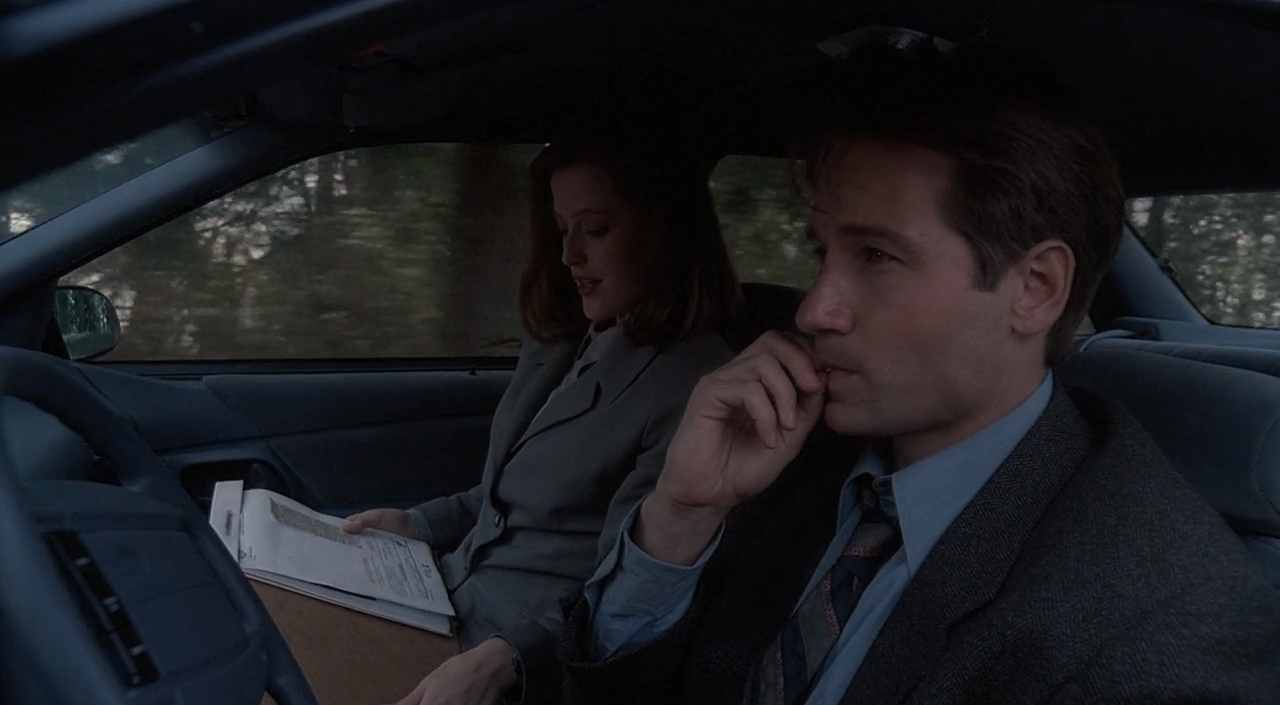 “Better than you expected or better than you hoped?”
“Better than you expected or better than you hoped?”
There are a lot of layers there. She’s letting him know that she’s not dumb, and that she can see that he’s questioning her motives. She’s also reminding him that she will call him out on disrespecting her intellect, and I think the smile she gives him when she says it reinforces that. Unfortunately Mulder doesn’t yet know the awesomeness he’s been blessed with, so he follows this up with asking her whether she’s going to be squeamish about doing an autopsy. Ugh. Boys.
And talking of that autopsy, which turns out to be an orangutan (not the weirdest autopsy Scully will perform in her career), Mulder follows up his brilliance in the car by ordering her around about the tests he wants done. He’s got a bad habit of giving her orders, and I wish I could say he didn’t. I think this is one of the few elements that really dates the show ideologically. It does also speak to Mulder’s utter devotion to his quest. I wouldn’t even call it self-absorption, because as we will see increasingly, Mulder doesn’t give himself a lot of time or care. But that doesn’t mean that he can’t be loving or caring. Mulder cares about everything, so much that he often acts like he doesn’t care as a defense mechanism. His actions are often in keeping with his personal and psychological background, and I’ll be looking at that as we go on. Other times his behavior (and Scully’s) is the result of sloppy writing and shoehorning conflict in to make things exciting—which shall henceforth be known as C³, for ‘Carter Created Conflict.’ It’s easy to condemn Mulder at times, especially in a feminist reading. I have no intention of going easy on him, but I do love Mulder very much and I think there’s a lot of room for a Mulder-friendly feminist reading. Anyway, moving on.

He finally gets his shit together when he sees that Scully has no time either for his bossy antics or his baseless theorizing. “I’m not crazy, Scully,” he says, finally stopping long enough to look her in the eye. It’s not just a statement. He’s pleading, using his best MulderSoftVoice™. “Please don’t think I’m crazy, Scully,” would be equally at home in this scene. Mulder is so painfully used to rejection that he has come to anticipate it and assume it’ll be there even as he hopes it won’t be. That’s again not an excuse for him acting like an asshat, but it’s interesting because it’s so realistic for a person of Mulder’s life experience. This is mirrored in the cemetery scene, when Mulder explains to Scully his entire theory and Scully just stands in the rain staring blankly at him. “You think I’m crazy,” he says, far more to himself than to her, with a shrug and a resigned smile.
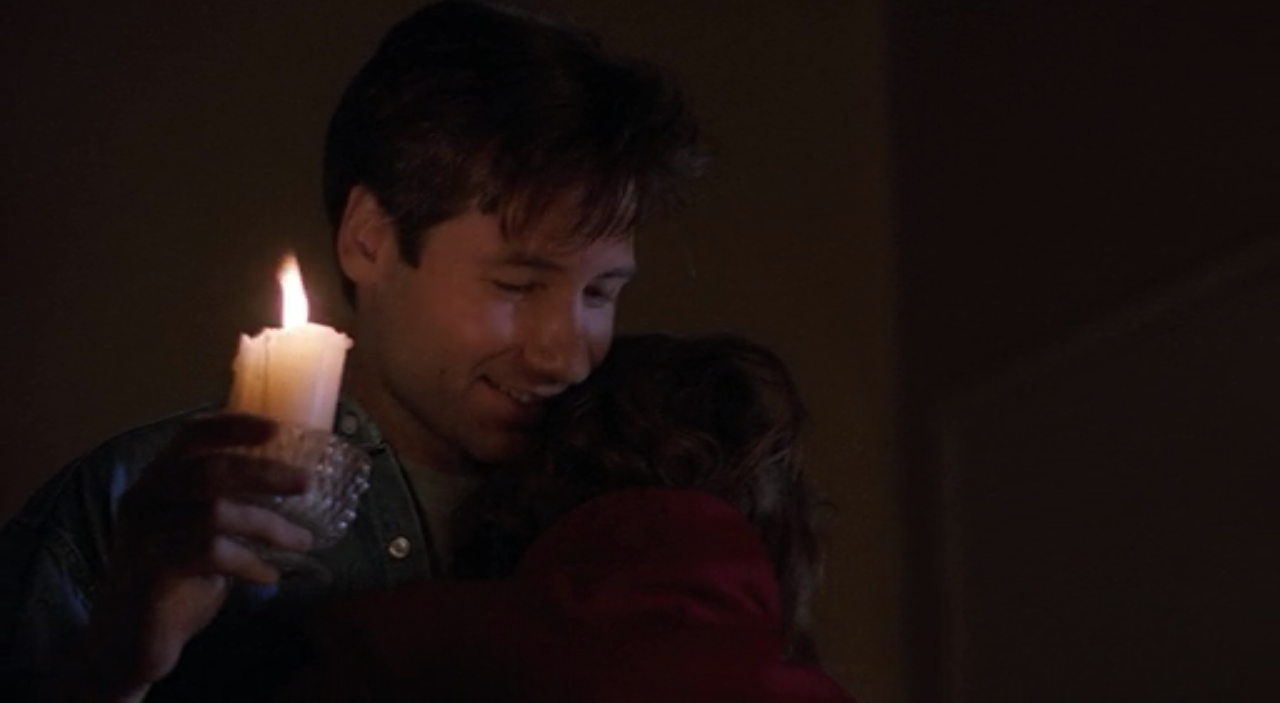
All right, let’s talk about the thing with the mosquito bites. Rather than writing long form, which would take a fucking age, I’ve just tidied the notes I took while watching in prep to write this:
Mosquito Bites
- Sure, she could’ve put on a shirt. Or pants. Definitely.
- Also she’s a grown-ass adult who should probably be able to figure out what a mosquito bite looks and feels like. She’s a MEDICAL DOCTOR with a degree in physics and a crush on Einstein. C’moooon
- But I love it as is: his surprise and immediate concern when he opens the door
- Her delivery of the ‘I want you to look at something’ line, there’s fear there & seeking reassurance
- Her going to him shows us that despite this world being so new and foreign and overwhelming to her she feels safe with Mulder
- Her steeling herself before dropping the robe, and indicating the bites with her eyes
- His knowing not to show a reaction to her panic or her undies
- His gentleness in looking at her and his own palpable relief
- He makes no jokes at all the whole scene but especially lets her hug him as long as she wants to without comment, but keeps moving his head to try to look at her, even stands at the ready to take her in his arms again when she gets self-conscious and backs away
- He’s shocked and solicitous when she’s shaking, guides her to table, tells her to take her time, leaning toward her and watching over her
- But it’s not erotic, which would have been inappropriate NOT BECAUSE THEIR RELATIONSHIP PRECLUDES IT CARTER YOU MORON, but rather because she was afraid. So what we get instead is something that should have looked like a gratuitous skin scene looking far far more like the establishment of trust empathy and intimacy
…All of which is why the following Tale of Samantha scene makes sense. Mulder reveals the defining moment in his life; or one of them, anyway. Whether he realizes it or not, another defining moment of his life is happening right then. I can’t imagine he’s told many people this story, or that he has ever met with the sympathy and understanding (if not belief) that Scully offers him. Her reaction is a huge note for her character. This person she barely knows just revealed the most searing, painful secret of his life, and it involves aliens for God’s sake. She neither believes nor discredits him, she just sympathizes and encourages him to trust her.
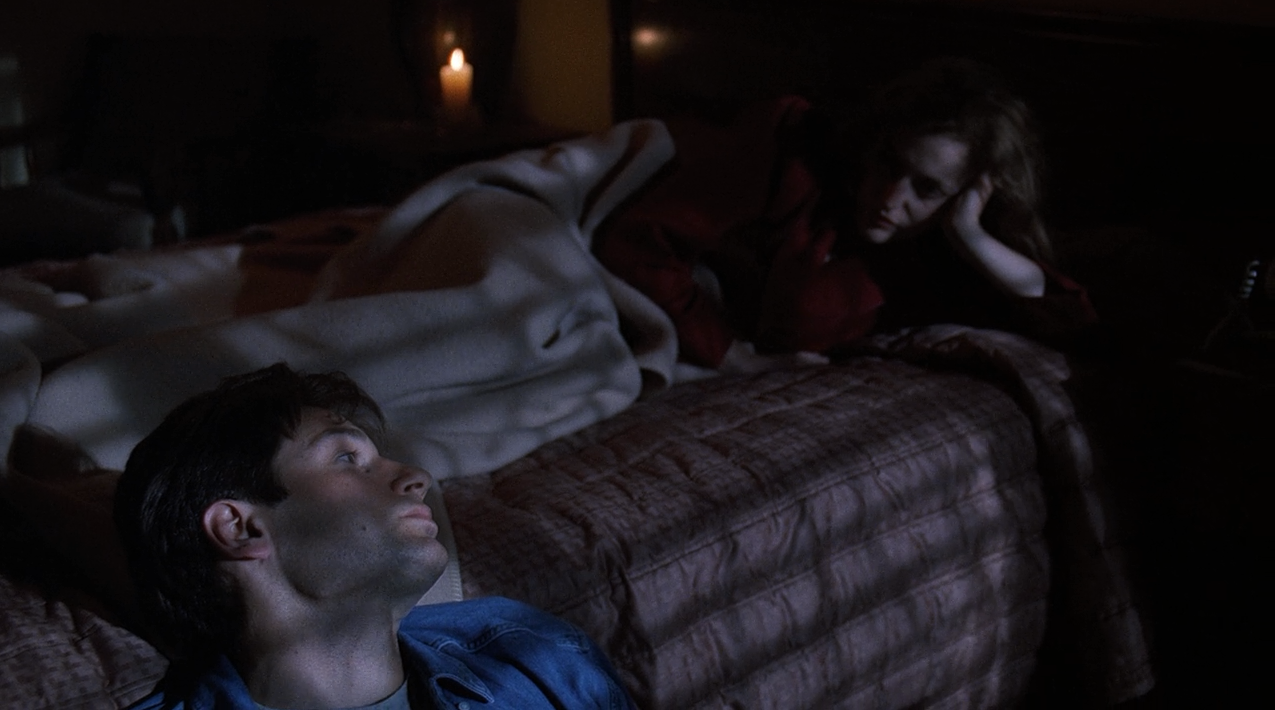 Only connect.
Only connect.
This scene is unexpected because it reveals Mulder’s big secret right away. Most characters with a mysterious or traumatic past have to wait a season or two before finally talking about it. Mulder’s story has two very telling psychological factors: one, Mulder was already twelve years old when his sister was taken. At twelve, we as humans are starting to feel our autonomy and beginning to feel responsible for controlling what happens to us. Two, it’s vague here but Mulder soon reveals that he was present at the time of Samantha’s abduction and was unable to help her, despite her calling for him. If the aliens thing gets in the way, imagine that Mulder instead is talking about watching his sister being beaten by their parents. The depth of the trauma, the helplessness and guilt that would cause, is almost impossible to overstate.
I’m actually going to skip to the end of the episode, because again character > plot on this one. Back in DC, we get the second of the scenes which bookend the episode: Scully and the Panel o’ Patriarchy. Scully’s attitude is completely flipped from what it had been at the beginning of the episode. Just as they won’t acknowledge the game she’s supposed to be playing, she won’t even pretend to them that she’ll play it. She has massive integrity as a character, and she doesn’t even get self-righteous about it.
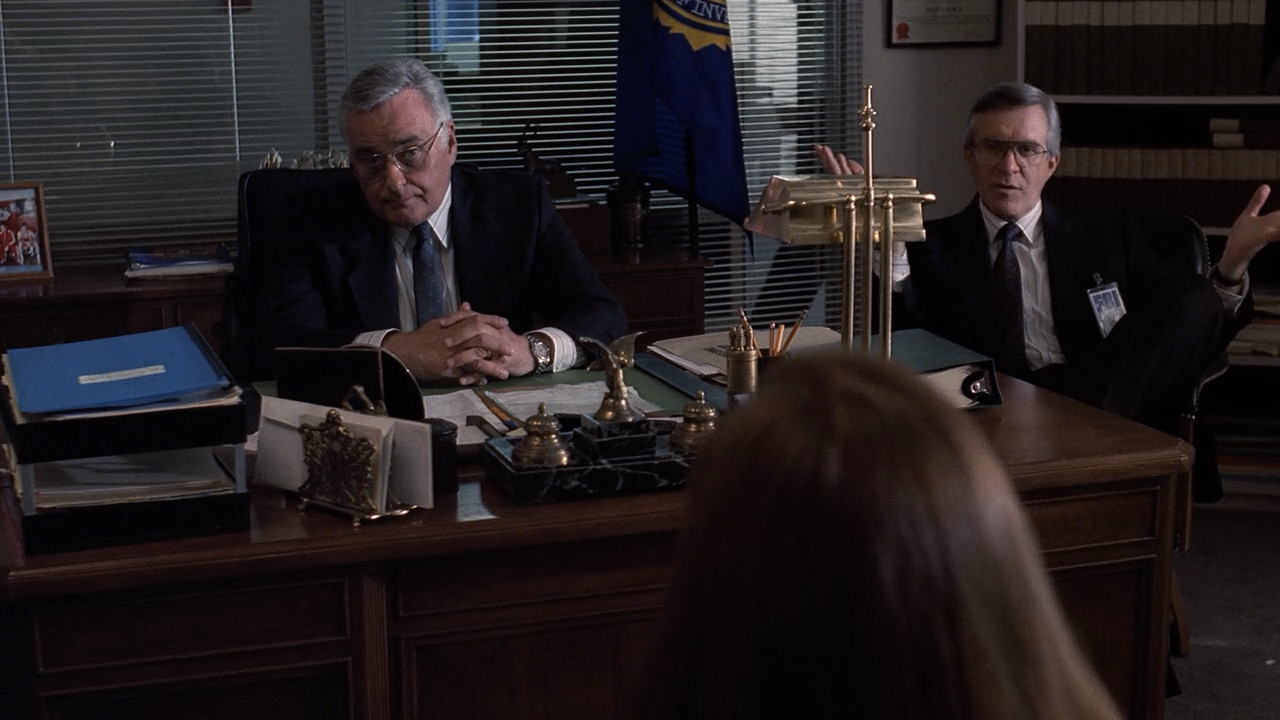 Completely immune now to Blevins’ disappointed daddy routine.
Completely immune now to Blevins’ disappointed daddy routine.
At which point they immediately transition to treating her as an enemy. Blevins says, “You don’t have any physical evidence,” when it was never Scully who made the claims that are in her report. Scully, meanwhile, keeps her cool. She plonks the implant on his desk and Blevins, barely covering his embarrassment, dismisses her. Her poise in this scene is only a glimpse of the strength we’ll see in her throughout the series.
And thus a partnership is born. And while they didn’t know it at the time, a Big Bad is established in the Cigarette Smoking Man, with his Raiders of the Lost Arc stash of shit in the Pentagon and his general air of intrigue and creepiness.
Bonus:
For no particular rhetorical reason, I really love that Mulder and Scully are apparently able to stare at one another through a two-way mirror.
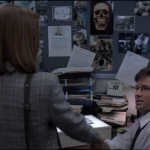
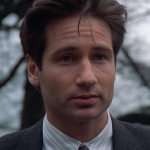
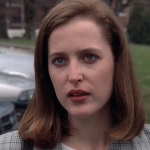
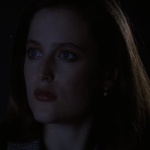
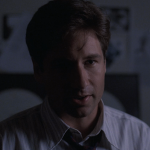
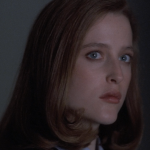
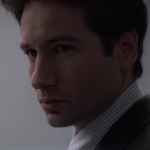
Reblogged this on Robin C. Farrell.